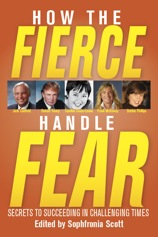According to a press release from the Independent Publisher Book Awards (known as the IPPYs), 500,000 new books are published each year in the US alone, with millions of new titles worldwide. The pitch I received also highlighted that 80% of people have considered writing a book! 80% seems really high, given that Statista calculates the mean number of books read in the US at just over one per month per person – and that includes e-books and audiobooks.
Still, I often hear anecdotally that being a published author is a bucket list item. This hedge fund lawyer by day/ author by night gave up his mornings and evenings for years to publish an action trilogy. I have three published books under my belt, most recently Jump Ship: 10 Steps To Starting A New Career. I also co-wrote a job search textbook that is used at dozens of universities.
My first book project was contributing an essay to an anthology entitled, How The Fierce Handle Fear. It was an Amazon bestseller in several self-help categories when it debuted in 2010. A number of big names contributed to the book – Jack Canfield of Chicken Soup For The Soul fame, Pam Slim who coined the ubiquitous phrase, “side hustle”, in her bestseller, Escape From Cubicle Nation, and even a pre-POTUS Donald Trump, whose fear essay was about having no fear.
A perk of the project, in addition to drafting off the fame and credibility of established authors, was getting custom copies of the book with my picture included in the cover. I have editions of the book where my picture is next to Donald Trump’s. Regardless of which side of the aisle you fall, I feel like this book will be a collector’s item.

None of my books are money-makers on their own. My largest advance was a low five-figures, and royalties are minimal. However, getting a book published definitely helped me achieve financial independence, even though they didn’t generate a lot of income. If achieving FI is a goal and you’re possibly interested in being a published author, here are five reasons to get on that book project now:
1 – Build good habits similar to what you’ll need to achieve FI

Getting a book finished is a substantial project. Whether you write it solo, work with a co-author, contribute to an anthology or even hire a ghost writer to pen the words, it takes focus, discipline and resolve to get from blank page to a finished manuscript, from manuscript to published book and then from published book to a product that is marketed to the world (or even just your friends and family).
These same habits should help you stick to your money goals. At the very least, all the time you’ll spend on your book project means less time mindlessly shopping or eating out.
2 – Leave a legacy for your kids

Legacy is more than an inheritance. Even if your book doesn’t sell enough to give your kids a trust fund, it gives them a shining example of going after a dream, of creating something from nothing, of dedicating time and effort to a single purpose.
If your book incorporates stories from your life, summarizes your expertise or shares your advice or philosophy, then your book is something that can be passed on from generation-to-generation.
3 – Structure your ideas for a consulting offering or a course
If your book is based on what you do for a living, having to commit your knowledge to print is like drafting your potential services as a consultant. Or maybe your expertise makes a good online course or live workshop. Either or both of these options can become another income stream that gets you closer to financial independence.
Working on a book gives you time to sort through your ideas on your own without worrying about pitching to companies or finding an audience for your class. Once the book is done, it can be part of your marketing engine for your consulting side gig, courses or both.
4 – Curate your content for blogs and social media

Publishing blog posts, or even just comments on social media, is a way of showcasing your expertise. Your book is a compilation of potential blog posts and comments. Even if you’re not marketing a course or consulting, and it’s just you in a traditional job, you’re still marketing yourself for career advancement or just better job security.
If the book leads to more consistent blogging and/or commenting which leads to a more prominent online profile, recruiters could notice and introduce better-paying opportunities. At the very least, you’ll be better positioned to launch a job search quickly in the event of an unexpected layoff.
5 – Find your voice for speaking engagements or teaching
A book project can help you find your voice and message for an audience. This can turn into another income stream you can develop on the side — speaking or teaching.
One of my career coaching clients loved his job but felt limited growth in the near future (he was relatively early in his career, and his company had middle managers with decades of experience). Without an obvious path to promotion (and its additional growth, challenge and financial reward), he accepted an adjunct teaching role.
In addition to discovering a love for teaching, the role honed his expertise in his field, established his credibility and brought in additional income.
Notice I focus on “publishing” and not “writing” a book — because you don’t have to write it
If you’re interested in being a published author, but are paralyzed at the thought of having to write the 30,000 words or more to finish a book, there are other options to pursue. Hiring a ghost writer is a financial investment, but it may be worth it if you can monetize your book with teaching, speaking, consulting, courses or, of course, book sales. You might also bring on a co-author, or find an editor working on an anthology that you can contribute to.
I worked my way into the Fierce anthology project because I read about it in a business newsletter I followed. It turned out that the editor and I had worked at the same company (though not at the same time). So I cold-called the editor – LinkedIn and other social platforms make it easy to get in touch – and used our common history, and my guest blog posts to date, as reason enough to get me involved.
How can you get the book brewing inside of you published and out there as an additional tool to achieve financial independence?


 We are Scott and Caroline, 50-somethings who spent the first 20+ years of our adult lives in New York City, working traditional careers and raising 2 kids. We left full-time work in our mid-40’s for location-independent, part-time consulting projects and real estate investing, in order to create a more flexible and travel-centric lifestyle.
We are Scott and Caroline, 50-somethings who spent the first 20+ years of our adult lives in New York City, working traditional careers and raising 2 kids. We left full-time work in our mid-40’s for location-independent, part-time consulting projects and real estate investing, in order to create a more flexible and travel-centric lifestyle.  Financial independence and early retirement is not something we originally focused on, but over time realized it was possible. Our free report,
Financial independence and early retirement is not something we originally focused on, but over time realized it was possible. Our free report, 







